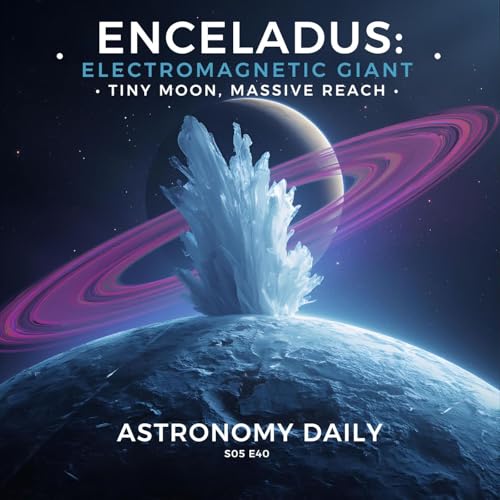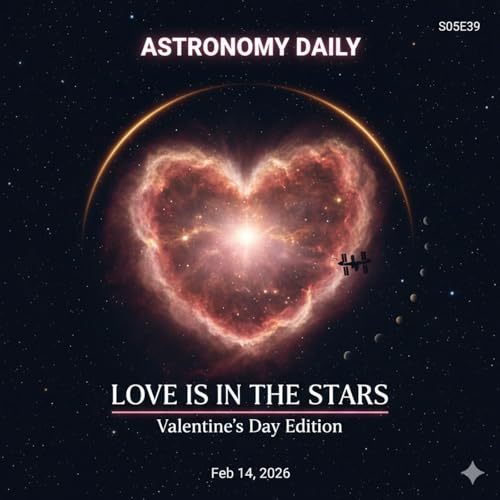Episode: S05E42 — Wednesday, February 18, 2026 Hosts: Anna & Avery Network: Bitesz.com Podcast Network In today's episode of Astronomy Daily, Anna and Avery cover six unmissable stories from across the cosmos. Here's what we're talking about in S05E42: 1. Artemis II Wet Dress Rehearsal Round Two NASA begins fuelling the SLS moon rocket tomorrow (Feb 19) for a second critical practice countdown. Engineers have replaced two seals and a filter after hydrogen leaks forced the February launch window to be abandoned. A clean test is required before NASA will commit to a launch date — currently no earlier than March 6. The four-person crew includes Victor Glover, Christina Koch, and Jeremy Hansen, each of whom will make history on the flight. 2. Moon Occults Mercury Tonight — Plus a Ganymede Transit Tonight, February 18, a thin crescent Moon passes so close to Mercury that observers in Arizona, New Mexico, Texas, Louisiana, Mississippi, and Georgia will see the Moon hide Mercury in a rare occultation. For everyone else, a stunning close conjunction is visible in the western sky just after sunset. Simultaneously, Jupiter's moon Ganymede transits the gas giant's face through the night. Two events, one evening. 3. Ariane 6 Launches Amazon Kuiper Satellites Europe's most powerful Ariane 6 configuration successfully launched 32 satellites for Amazon's Project Kuiper broadband constellation today — a direct competitor to SpaceX's Starlink. The launch highlights both the commercial ambitions of Amazon's internet satellite programme and the ongoing resurgence of European launch capability. 4. 3I/ATLAS Update: JUICE Data Downlinking Now ESA's JUICE spacecraft is currently transmitting data it collected on interstellar comet 3I/ATLAS back to Earth — the downlink window runs February 18–20. If successful, this would be the closest-ever spacecraft observations of an interstellar object. Meanwhile, 3I/ATLAS heads toward a close Jupiter flyby in March that may trigger fresh outbursts. 5. How Titan Formed — And Why Saturn Has Rings New research from the SETI Institute proposes a single ancient catastrophe that explains multiple Saturn mysteries at once: a moon called proto-Hyperion collided with proto-Titan about 400 million years ago. The merger debris re-accreted into Saturn's inner moons and left behind the iconic ring system. The hypothesis also explains Saturn's unusual axial tilt, Iapetus's orbital inclination, and the surprising youth of Titan's surface. 6. Russia's 30-Day Mars Engine Rosatom's Troitsk Institute is ground-testing a nuclear-powered magnetoplasma engine that its developers claim could reach Mars in 30 days — compared to 8 months for chemical rockets. With a plasma exhaust velocity of 100 km/s, the system is part of a global race toward deep-space plasma propulsion also being pursued by NASA's VASIMR programme and Chinese researchers. A flight prototype is targeted for 2030.
Follow & Connect 🌐 astronomydaily.io 📱 @AstroDailyPod 🎙️ Available on all major podcast platforms 📺 YouTube — optimised for mobile viewing Astronomy Daily is part of the Bitesz.com Podcast Network.
Become a supporter of this podcast: https://www.spreaker.com/podcast/astronomy-daily-space-news-updates--5648921/support.
Sponsor Details:
Ensure your online privacy by using NordVPN. To get our special listener deal and save a lot of money, visit www.bitesz.com/nordvpn. You'll be glad you did!
Become a supporter of Astronomy Daily by joining our Supporters Club. Commercial free episodes daily are only a click way... Click Here
This episode includes AI-generated content.
Show more
Show less
 16 mins
16 mins 21 mins
21 mins Feb 19 202618 mins
Feb 19 202618 mins 18 mins
18 mins 19 mins
19 mins Feb 16 202615 mins
Feb 16 202615 mins Feb 14 202614 mins
Feb 14 202614 mins 18 mins
18 mins
